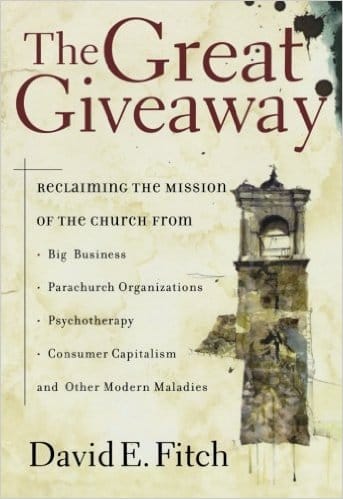The Great Giveaway


A lot of books critique the modern evangelical church. A critique can be helpful, but what is even more useful is some help on how to be the church more faithfully. It’s even better if this help is given from someone who is thoughtful, not just pragmatic, and a practitioner, not just a theoretician.
The Great Giveaway is a book that offers this type of help. It’s written by David E. Fitch, pastor of Life on the Vine Christian Community in Long Grove, Illinois.
“The thesis of the book is that evangelicalism has ‘given away’ being the church in North America” (p.13). How? By forfeiting the practices that constitute being the church.
According to Fitch, evangelicalism has given away being the church by accepting the assumptions of modernism, which are increasingly suspect.
The Great Giveaway examines how the church has given away eight functions of the church to modernity, and offers solutions on how to recover each function:
- Our definition of success – We measure success by size because we have accepted the modern values of individualism and efficiency. Big churches are seen as successful, when it is more difficult to be the church past a certain size. Instead, success should be measured by measuring faithfulness rather than size.
- Evangelism – We rely on arguments, presentations, and proofs in our Gospel presentations, rather than embodying the reality of Jesus Christ being lived within our churches.
- Leadership – We have imported CEO-styles of leadership into the church, and measured pastors by success in ministry more than faithfulness to Christ. CEO-style leaders are isolated and it is assumed they can manage their own sanctification. Instead, the church needs to rediscover leadership as servanthood and not as vocational success.
- Worship – We measure success in worship by positive emotional experiences and the hearing of “good” sermons. In other words, the individual self is at the center of worship, and that individual self has been more formed by the post-Christian world than by the reality of God. Instead, we should reclaim worship practices that form us into the experience of God, rather than attempting to shape God into our experience.
- Preaching – Expository preaching is not as biblical as we think. It allows both the preacher and the audience to control the Word, and it often results in “to do” lists. Instead, preaching should proclaim the reality of who God is, and invite us to live in that reality.
- Justice – Our definition of justice is more shaped by liberal democracy and capitalism by Scripture. We need to recapture the Biblical ideal of justice, and learn how to live in capitalism but not of it.
- Spiritual Formation – We have accepted therapy and psychology, and in many cases have substituted these for the biblical practices of confession, repentance, and speaking the truth in love in the context of community.
- Moral Education – Our children are shaped by a post-Christian culture rather than by the reality of Christ lived out in church. We need to reclaim practices that raise up our children to be faithful followers of Christ.
Fitch writes:
We must recover the truly amazing way of life given to us as people by God through his redemption in Jesus Christ. The only way we can resist the totalizing forces of late capitalism and its derivatives is by recovering being the church. Is this not possible?…I hope this book gives hope and direction to seminarians, pastors of small churches, and all those people who have tired of evangelicalism’s incessant marketing and mega-sizing. May we start gatherings of people that practice the practices of being the body of Christ. As difficult as it might be, let us join to together and find our way back to the practices of being the people of God under the reign of our Lord and Savior Jesus Christ. For he truly is the hope of the world.
I love the idea of developing a reinvigorated ecclesiology. I am sometimes frustrated by those who dismiss the church because of its current state. Fitch doesn’t do this. Instead, he imagines what it should be.
I also love the depth of this book. Many of the individual chapters contain more to think about than some whole books I’ve read. The endnotes (over 30 pages) are a gold mine. The Great Giveaway is very well thought out, and it stimulates thinking rather than giving all the answers.
I have rarely read a book that has stimulated so much thinking. At times I wished that I had more concrete action steps and a clear picture of what such a church. Instead, Fitch did exactly what he described in his chapter on preaching: he refused to give me a to-do list, and instead unfurled a reality, and invited me to enter in.
This is easily one of the top books that I have read this year.
More from Amazon.com | Amazon.ca | The Great Giveaway webpage | The Great Giveaway blog





